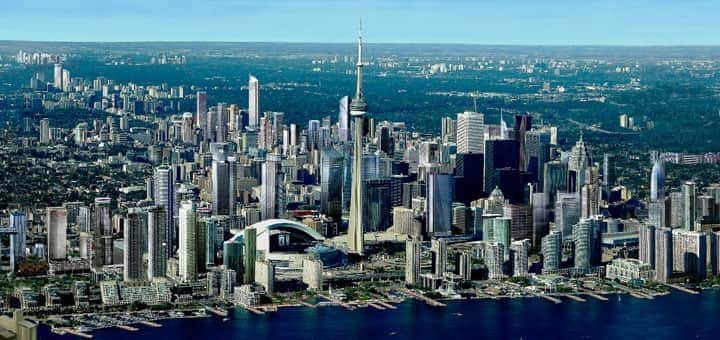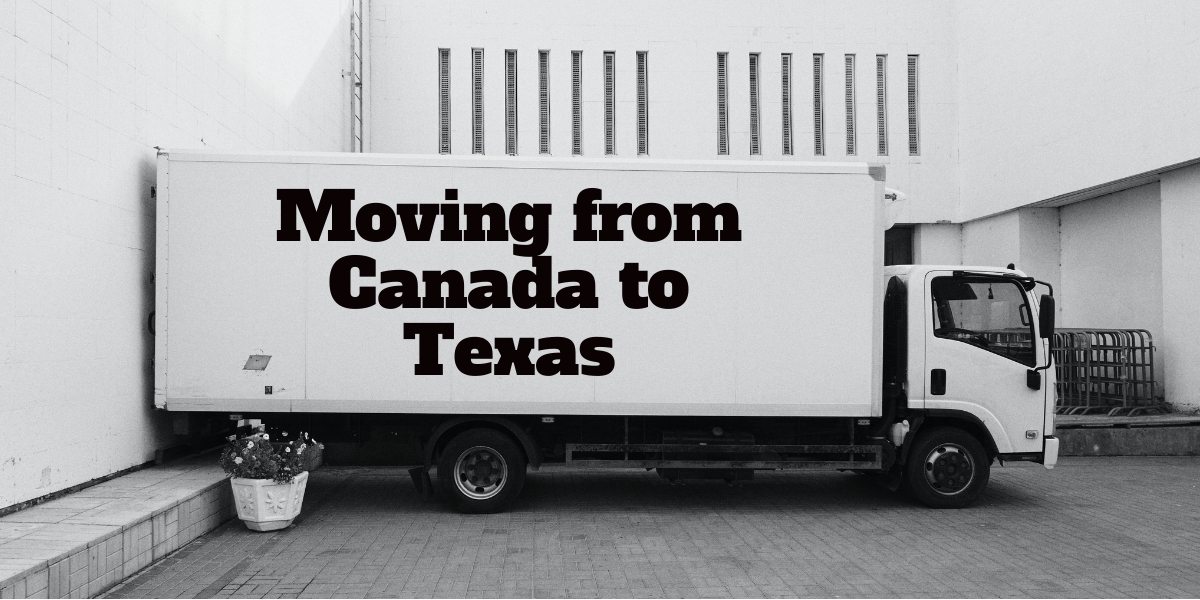Moving From Texas To Toronto
Making the move from Texas to Toronto can be a daunting task, especially when considering the vast cultural and geographical differences between the two locations. Leaving behind the warm Texan climate and BBQ joints for the bustling streets of Toronto and its cosmopolitan vibe can be overwhelming. However, with its diverse neighborhoods, world-class amenities, and unparalleled job opportunities, Toronto has become a magnet for many Texans looking to start anew. In this article, we'll explore the essential things to know when making the transition from the Lone Star State to the Six.

Embracing the Great White North: A Guide to Moving from Texas to Toronto
Moving from Texas to Toronto can be a significant change, but with the right mindset and preparation, it can be a fantastic adventure. Toronto, the largest city in Canada, offers a unique blend of cultural diversity, vibrant neighborhoods, and world-class amenities. Here's what you need to know to make a successful transition:
Climate and Weather: Preparing for the Great White North
When moving from Texas to Toronto, one of the biggest adjustments you'll face is the climate. Toronto experiences a continental climate with cold winters and warm summers. Be prepared for: Cold winters with average temperatures ranging from 14°F to 30°F (-10°C to -1°C) Warm summers with average temperatures ranging from 65°F to 85°F (18°C to 30°C) Snowfall: Toronto receives an average of 37 inches (94 cm) of snow per year, so invest in warm clothing and waterproof gear
Cost of Living: What to Expect in Toronto
The cost of living in Toronto is relatively high compared to many cities in the United States. Here are some key expenses to consider: Housing: The average rent for a one-bedroom apartment in Toronto is around $2,000 CAD ($1,500 USD) per month Food: Eating out can range from $15 to $30 CAD ($11 to $22 USD) per meal, while groceries can cost around $100 to $150 CAD ($75 to $110 USD) per week for basic items Transportation: A monthly public transit pass can cost around $150 CAD ($110 USD)
Job Market and Economy: Finding Opportunities in Toronto
Toronto is a hub for various industries, including finance, technology, and healthcare. When looking for a job, consider: Major industries: Finance, technology, healthcare, and tourism Job search platforms: Utilize online platforms like LinkedIn, Indeed, and Glassdoor to find job openings Networking: Attend industry events and connect with professionals in your field to build relationships and opportunities
Healthcare and Insurance: What You Need to Know
Canada's healthcare system is publicly funded, but there are some key differences to be aware of: Public healthcare: Canada's public healthcare system is covered by the government, but you may need to pay for some services out of pocket Private insurance: Consider purchasing private insurance to cover additional services like dental care and vision care Prescription medication: Be prepared to pay for prescription medication, as it's not always covered by the public healthcare system
If you're a U.S. citizen moving to Toronto, you'll need to navigate the immigration process: Visa options: Research the various visa options, such as the Express Entry program or a work permit Required documents: Gather necessary documents, including a valid passport, proof of income, and police certificates Application process: Submit your application online or through a paper application, and be prepared for processing times that can range from a few months to several years
| Category | Texas | Toronto |
|---|---|---|
| Cost of Living Index | 84.6 | 74.3 |
| Average Temperature (°F) | 65.3 | 44.4 |
| Average Snowfall (in) | 2.5 | 37 |
| Unemployment Rate (%) | 3.4 | 5.5 |
How much does it cost to move from Texas to Canada?

The cost of moving from Texas to Canada can vary greatly depending on several factors, including the distance, weight, and mode of transportation. Here are some estimated costs to consider:
Transportation Costs
The cost of transporting your belongings from Texas to Canada will depend on the mode of transportation you choose. Here are some estimated costs:
Truck Rental: Renting a truck and driving it yourself can be a cost-effective option. The cost of renting a truck can range from $2,000 to $5,000, depending on the size of the truck and the distance.
Hiring Movers: Hiring professional movers can be more expensive, but it can also be less stressful. The cost of hiring movers can range from $4,000 to $10,000 or more, depending on the weight and distance of your belongings.
Shipping Container: Another option is to use a shipping container, which can be a cost-effective option for smaller moves. The cost of shipping a container can range from $2,000 to $5,000.
Customs and Duties
When moving to Canada, you'll need to consider the costs of customs and duties on your belongings. Here are some estimated costs:
Duty-Free Allowance: You may be eligible for a duty-free allowance on certain items, such as clothing and personal effects. However, you'll need to declare these items and provide receipts.
Customs Duties: You'll need to pay customs duties on items that exceed the duty-free allowance. The cost of customs duties can range from 5% to 20% of the item's value.
GST and PST: You'll also need to pay Goods and Services Tax (GST) and Provincial Sales Tax (PST) on certain items.
Other Costs to Consider
In addition to transportation and customs costs, here are some other costs to consider:
Travel Costs: You'll need to consider the cost of traveling from Texas to Canada, including flights, hotels, and food.
Housing Costs: You'll need to find a place to live in Canada, which can include costs such as rent, utilities, and deposits.
Health Insurance: You may need to purchase health insurance to cover yourself and your family while you're in Canada.
- Research different moving companies and compare prices to find the best deal.
- Downsize your belongings to reduce the weight and volume of your move.
- Consider shipping non-essential items ahead of time to reduce the cost of transportation.
Is Toronto a good place to move to?

Is Toronto a Good Place to Move to?
Toronto is a popular destination for people looking to move to Canada, and for good reason. The city offers a unique blend of diversity, culture, and opportunities that make it an attractive option for individuals and families alike. Here are some reasons why Toronto might be a good place to move to:
Job Opportunities
Toronto is a hub for many industries, including finance, technology, and healthcare. The city is home to many major companies, startups, and innovation centers, making it an ideal place to find a job or start a business. According to the City of Toronto's official website, the city has a low unemployment rate of around 5%, which is lower than the national average.
Some of the top industries in Toronto include:
- Finance and banking
- Technology and software development
- Healthcare and biotechnology
- Manufacturing and logistics
- Tourism and hospitality
Diversity and Culture
Toronto is known for its diversity, with over 50% of residents born outside of Canada. The city celebrates its multiculturalism through various festivals and events throughout the year, such as the Toronto International Film Festival, Pride Week, and the Caribbean Carnival. Toronto is also home to many museums, art galleries, and cultural institutions, making it a great place for people who appreciate the arts.
Some of the cultural attractions in Toronto include:
- The Royal Ontario Museum
- The Art Gallery of Ontario
- The Toronto Symphony Orchestra
- The St. Lawrence Hall
- The historic Distillery District
Quality of Life
Toronto offers a high quality of life, with access to many amenities and services. The city has a comprehensive public transportation system, including buses, streetcars, and subways, making it easy to get around without a car. Toronto is also home to many parks and green spaces, such as High Park and the Toronto Islands, which offer a peaceful escape from the hustle and bustle of city life.
Some of the benefits of living in Toronto include:
- Access to quality healthcare and medical facilities
- A wide range of housing options, from apartments to single-family homes
- Plenty of opportunities for outdoor activities, such as hiking and cycling
- A vibrant food scene, with many restaurants and cafes serving cuisine from around the world
- World-class education institutions, including the University of Toronto and Ryerson University
Can I move to Toronto as an American?
As an American, you may be wondering if you can move to Toronto, one of Canada's most vibrant cities. The short answer is yes, but there are some essential considerations to keep in mind.
Understanding Immigration Options
When it comes to moving to Toronto as an American, you'll need to explore your immigration options. Canada offers various pathways for U.S. citizens, including:
- Express Entry Program: This is a points-based system that considers your skills, education, language proficiency, and work experience. You can create an online profile, and if you meet the eligibility criteria, you'll be entered into a pool of candidates.
- Work Permits: If you have a job offer in Toronto, your employer may need to obtain a Labour Market Impact Assessment (LMIA) to prove that they cannot find a Canadian citizen or permanent resident to fill the position.
- Study Permits: If you want to study in Toronto, you'll need to apply for a study permit. This will allow you to attend a Canadian educational institution, and in some cases, you may be eligible to work part-time.
Meeting Eligibility Criteria
To be eligible to move to Toronto as an American, you'll need to meet certain criteria, including:
- Age: You must be at least 18 years old to apply for permanent residency or a work permit.
- Language Proficiency: You'll need to demonstrate language proficiency in either English or French, depending on the immigration program you're applying for.
- Education and Work Experience: You'll need to provide documentation showing your educational background and work experience, as these are important factors in the immigration process.
Preparing for Life in Toronto
Before making the move to Toronto, it's essential to prepare for life in Canada. Consider the following:
- Culture Shock: Be prepared for cultural differences and nuances that may vary from what you're used to in the United States.
- Healthcare: Canada has a publicly-funded healthcare system, but you may need to purchase private insurance to cover certain services.
- Taxes: As a resident of Canada, you'll be required to file taxes with the Canada Revenue Agency (CRA).
Why are so many Canadians moving to Texas?

The phenomenon of Canadians moving to Texas has been on the rise in recent years, with many making the Lone Star State their new home. So, what's behind this trend?
Lower Cost of Living
One of the primary reasons Canadians are flocking to Texas is the lower cost of living. Compared to many Canadian provinces, Texas has a significantly lower cost of living, making it an attractive option for those looking to stretch their dollar further. Here are some key factors contributing to the lower cost of living in Texas:
- Housing costs: The cost of buying or renting a home in Texas is significantly lower than in many Canadian provinces, especially in cities like Vancouver and Toronto.
- Taxes: Texas has no state income tax, which means Canadians can keep more of their hard-earned money. In contrast, Canada's federal income tax rates range from 15% to 33%.
- Food and transportation: Everyday essentials like food and transportation are also cheaper in Texas, making it easier for Canadians to live comfortably on a budget.
Jobs and Career Opportunities
Another reason Canadians are drawn to Texas is the thriving job market. With major cities like Houston, Dallas, and Austin, Texas is home to a diverse range of industries, including:
- Energy and oil: Texas is at the heart of the US energy industry, with many major oil and gas companies headquartered in Houston.
- Technology: Austin is known as the Silicon Hills due to its growing tech industry, with companies like Google, Amazon, and Dell having a presence in the city.
- Healthcare: The Texas Medical Center in Houston is one of the largest medical complexes in the world, offering numerous job opportunities in the healthcare sector.
Quality of Life and Culture
Finally, Canadians are attracted to Texas due to its warm climate, rich cultural heritage, and outdoor recreational opportunities. Here are a few reasons why:
- Mild winters: After enduring harsh Canadian winters, many Canadians are drawn to Texas's mild winters and warm summers.
- Cultural attractions: Texas is home to a thriving arts and cultural scene, with numerous museums, galleries, and performance venues.
- Outdoor activities: With its vast deserts, mountains, and coastlines, Texas offers endless opportunities for outdoor adventure, from hiking and biking to surfing and skiing.
FAQ
What are the main differences in cost of living between Texas and Toronto?
The cost of living in Toronto is significantly higher compared to Texas. Housing costs in Toronto are among the highest in Canada, with the average rent for a one-bedroom apartment being around $2,000 CAD per month. In contrast, the average rent for a one-bedroom apartment in Texas is around $1,100 USD per month. Additionally, taxes in Canada are generally higher than in the US, with a federal goods and services tax (GST) of 5% and a provincial sales tax (PST) of 8% in Ontario. Furthermore, food prices in Toronto are also higher, with the average cost of a meal at a mid-range restaurant being around $20 CAD per person. However, healthcare in Canada is generally considered to be of high quality and is publicly funded, which can be a significant cost savings for individuals and families.
How do I go about getting a visa or permanent residency in Canada?
To move to Toronto from Texas, you will need to obtain a visa or apply for permanent residency in Canada. The process and requirements for obtaining a visa or permanent residency vary depending on your immigration status, country of origin, and purpose of stay. If you are planning to move to Toronto for work, you may need to obtain a work permit or have your employer sponsor your visa application. You can check your eligibility and apply for a visa or permanent residency through the Immigration, Refugees and Citizenship Canada (IRCC) website. It's recommended that you consult with a licensed immigration lawyer to ensure that you have the necessary documentation and follow the correct procedures.
What are the job opportunities like in Toronto compared to Texas?
Toronto has a diverse and robust economy with a strong presence of industries such as finance, technology, healthcare, and manufacturing. While Texas has a thriving economy, especially in the energy and aerospace sectors, Toronto offers a more diverse range of job opportunities. The city is home to many multinational companies and startups, and is a hub for entrepreneurship and innovation. Additionally, Toronto has a highly educated and skilled workforce, with many universities and research institutions. However, the job market in Toronto can be competitive, and it's essential to have a strong resume, network, and job search strategy to stand out.
How do I adjust to the cultural differences between Texas and Toronto?
Moving to Toronto from Texas can be a significant cultural adjustment. Toronto is a multicultural city with a diverse population, and you may encounter people from many different ethnic backgrounds and cultural traditions. The city also has a more urban and fast-paced lifestyle compared to many parts of Texas. To adjust to the cultural differences, it's essential to be open-minded, flexible, and willing to learn. You can also consider taking cultural orientation courses or joining expat groups to help you navigate the differences. Additionally, be prepared for weather changes, as Toronto experiences cold winters and mild summers, which can be a significant adjustment for those from Texas.